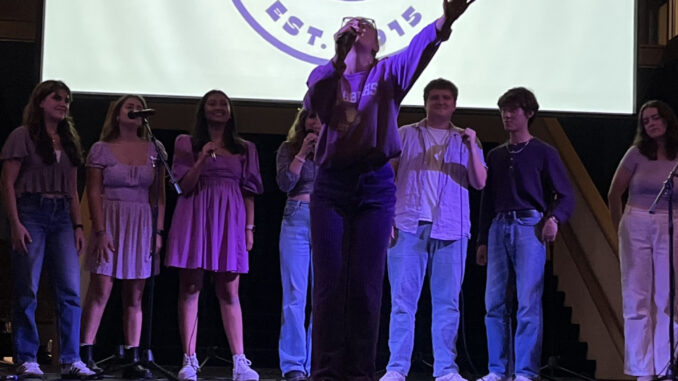
Natalie Rodriguez | Staff Writer
Friday’s performance was “aca-awesome” as Duquesne’s a capella group Mic Drop welcomed groups from three different schools for their annual “Beats on the Bluff.”
The visiting ensembles included Carnegie Mellon University’s (CMU) Treblemakers, C# Singers, Soundbytes, Counter Point and Reflexion; University of Pittsburgh’s Pitches and Tones, the Songburghs and Tonal Disruptions; and Indiana University of Pennsylvania’s (IUP) Crimson Chords.
While the groups finished warming up, the audience was welcomed into a sneak peek of what was to come, and the energy was palpable.
The night’s set list consisted of songs ranging from “Alejandro” by Lady Gaga, performed by Pitt’s Songburghs to the CMU Treblemakers’ mash up of Bruno Mars’ “Talking to the Moon” and the Halloween favorite from “Hocus Pocus,” Erutan’s “Come Little Children.”
CMU’s Soundbytes brought more soulful songs, such as “Envy” by Ogli while the Crimson Chords performed “Toxic” by Brittney Spears and CMU’s Reflexion made their performance debut with a rendition of “Try Everything” by Shakira.
Mic Drop closed the show with “Prisoner” by Miley Cyrus and Dua Lipa featuring soloist Melena Maglietta, a musical arrangement which was specially arranged by Mic Drop founder Blake Mechtel.
The night was filled with dynamic performances, and the energy extended to audience members as they moved along to the beats and melodies of the performances.
Many people may be familiar with a capella from the movie “Pitch Perfect,” but a capella is more than the glitz and glamor of the silver screen.
“We practice two times a week, and we have a winter concert and a spring concert. We also do the International Championship of Collegiate A Cappella, which is the same competition from Pitch Perfect,” said Maglietta, a Mic Drop soloist and first-year member.
When it comes to prepping for practices “Oftentimes, the music is sent out beforehand, and you can learn it through the voice memos and how it’s supposed to sound, and then we get together in the practice room and just go for it,” Maglietta said.
But songs don’t just arrange themselves. Music director Maksim Shcherbatyuk arranged and soloed in Mic Drop’s performance of “No Time to Die” by Billie Eilish. Before sending it out to be learned by the team, he spent the summer composing and perfecting it.
“I arranged ‘No Time to Die’ over the summer because it takes a lot of concentration, and I try to get it done in one or two sessions. Once practices start, we like to focus on building the energy of the team up to transfer it to the stage,” Shcherbatyuk said.
While most teams focus on competing and learning covers, the Songburghs recently released their own EP, “Feel Alive,” on Spotify.
“We do the International Championship of Collegiate A Cappella every year. Last year, we got second place in the quarter-finals and went on to semi-finals, and we also made an EP with our competition set. Other than that, we like to perform around the Pittsburgh community and sing wherever we can,” said President Sreya Dey.
Community is a prominent component of a capella, especially in the Greater Pittsburgh area. CMU’s Treblemakers (who claimed the title before the Treblemakers from the movie Pitch Perfect) have a similar schedule with competing and practicing.
“We start the year doing concerts. ‘Beats on the Bluff’ is actually our first show of the year. The competition season starts in January, and we start prepping in November,” said soloist and director of finance for the Treblemakers Dee Kumar.
The leading competition team at CMU enjoys participating in off-season events. “It’s a great way to meet other teams. We like being able to expand the a capella community,” said vice president of the Treblemakers, Eliot Herron.
This year’s “Beats on the Bluff” hosted more than double the number of teams and performers and the a capella community still continues to grow.
“I started planning for this event in February,” Mic Drop president Austin Meinert told the Duke. “We were in [the] quarter finals, and we saw and met a number of groups, including the Crimson Chords from IUP. I got in contact with them and essentially invited them while in competition.”
“I booked a space for the event back in March, and over the summer I was working with my board…[so we could] hit the ground running with everything. We ended up getting 11 new members, and part of the audition process used the songs we created over the summer during callbacks.”
Although the concert schedules are not yet finalized, you can catch Mic Drop’s next performance on DSTV’s Spooky Streaming and later at Duquesne’s Light-Up Night.

